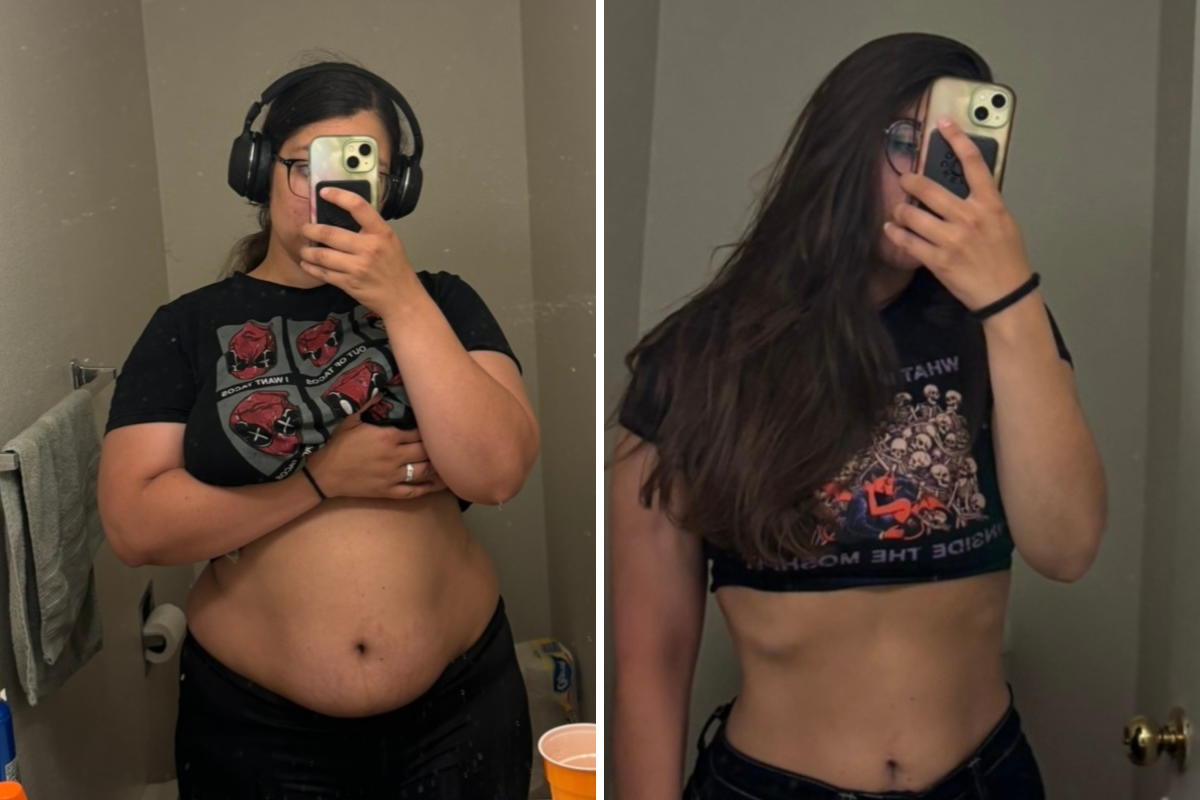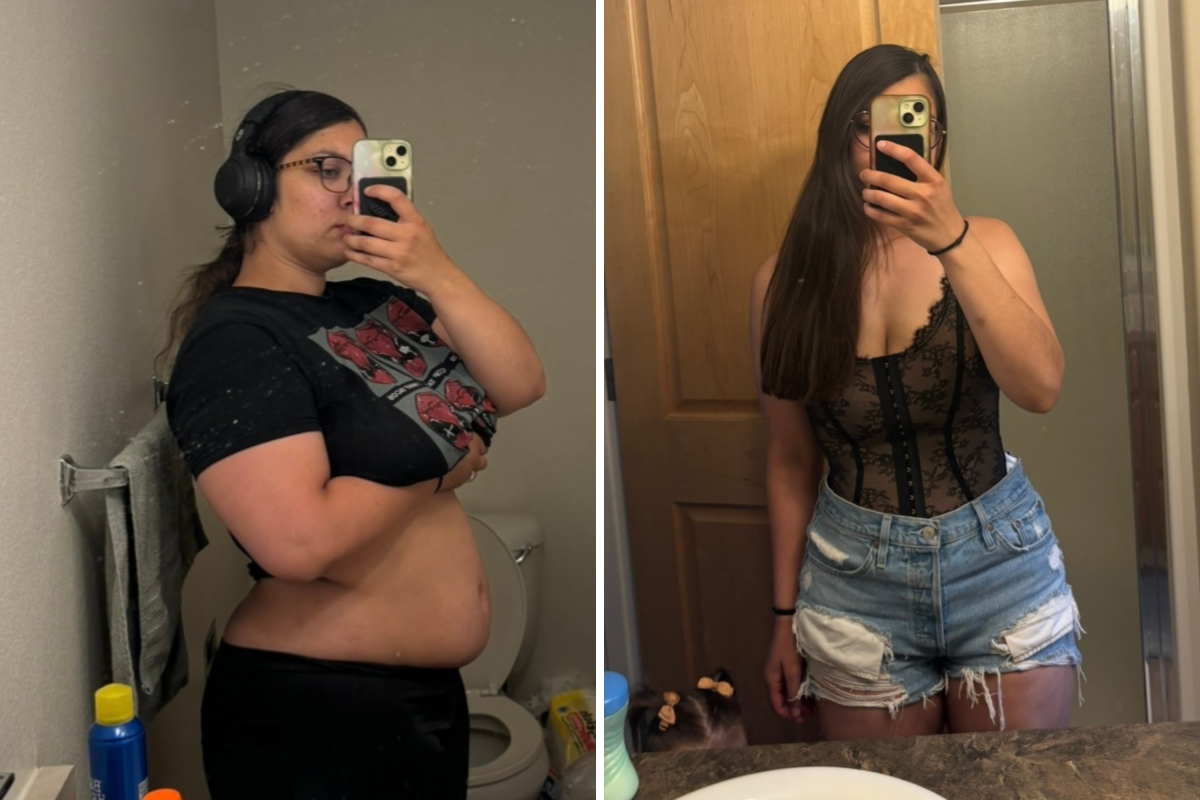Weight gain can bring unexpected health challenges, and for one woman, it led to the diagnosis of a serious sleep disorder.
After giving birth last February, Reddit user Erica, who goes by u/DifferenceNo2093 on the platform, became aware of her snoring thanks to her husband, who refused to sleep in the same bed. She was soon diagnosed with sleep apnea, a condition involving repeated breathing interruptions during sleep due to a blocked airway.
The cause was a 70-pound weight gain during pregnancy. Erica, from Tacoma, Washington, was advised to lose weight to relieve the symptoms. She followed that advice, and her transformation quickly gained attention online, racking up 9,600 upvotes.
Newsweek discussed the post, captioned “Just wanted to celebrate that I don’t snore anymore!” with the 29-year-old, who weighed 230 pounds at her heaviest.

Erica
According to the American Medical Association, about 30 million people in the United States have sleep apnea, but only 6 million have been diagnosed. Excess weight can contribute to or exacerbate the condition, and patients are encouraged to lose weight to alleviate symptoms.
“Sleep apnea often gets worse with extra weight, especially around the neck and upper airway. That extra tissue can make the airway narrower, which increases the chances of it collapsing during sleep,” Dr. Hussain Ahmad, a hospital doctor with 10 years of experience, told Newsweek.
“When someone loses a lot of weight, it reduces that pressure and can improve or even reverse sleep apnea. It doesn’t happen for everyone, but in many cases—especially if the apnea was mild to moderate—weight loss can make a big difference.”
Erica shared her experience with Newsweek: “When I gained weight during pregnancy, my husband didn’t sleep next to me, and would sleep on the couch. He took a video of me snoring, and it sounded like I was dying. I was absolutely horrified.
“I made an appointment and showed the video to my doctor. He said I probably had sleep apnea due to my weight, and I should book a sleep study. I feared living the rest of my life worried about if I’d stop breathing in my sleep,” she said.
“Now that I weigh 150 pounds, my husband said he doesn’t hear me snore ever, and my breathing is calm, quiet, and gentle.
“My dry mouth, nightmares, depression, fatigue, and memory problems disappeared,” she said.
The Reddit post includes a before-and-after image showing her transformation. While a Reddit emoji covers her face, Erica’s body has undergone a visible transformation. She attributes her 80-pound weight loss to fasting, eating one meal a day (OMAD), and walking 10,000 steps daily.

Reddit/DifferenceNo2093
“The doctor said he is not concerned for me anymore,” Erica said. “He said the amount of weight that I lost in a short period could be a huge contributing factor, as well as the fact that I’ve recently taken up running.”
She added: “My resting heart rate even went from 100 to 58, and I have also gotten rid of my high blood pressure completely.
“The icing on the cake is my husband sleeping next to me each night without me snoring.
“I hope my daughter looks up to me when she gets older and knows that your life doesn’t end when you have a baby—it’s just a new opportunity to find yourself again and to make your kid proud of your accomplishments.”
How Did She Lose 80 Pounds in 6 Months?

Erica
When her baby was 10 months old, Erica stopped breastfeeding and began fasting. There are several approaches to intermittent fasting, generally involving designated periods of eating and fasting.
Johns Hopkins Medicine highlights a common method: the 16:8 schedule, where you eat during an eight-hour window and fast for the remaining 16 hours. Another approach, the 5:2 method, involves eating normally five days a week and significantly restricting intake on two nonconsecutive days.
But she opted for a different path—fasting for several days at a time, followed by one large, healthy meal. However, this method isn’t recommended by Ahmad.
He told Newsweek: “Doing extended water fasts lasting two to three days at a time puts pressure on the body, especially if done often over several months.
“There’s a big risk of nutrient deficiencies, muscle loss, and in some cases, heart rhythm problems. That said, if someone is closely monitored and has regular blood tests and medical checkups, it can be done more safely. But I’d never suggest this kind of fasting without a GP or specialist involved.”
Erica explained: “I never felt weak or hungry, and I could literally see the visceral fat melting away from my stomach. Once I escaped morbid obesity and got close to a normal weight, I started doing OMAD (one meal a day), which I still practice to this day.”
Is Eating One Meal a Day Safe?
A 2021 study published in Frontiers in Physiology reported that consuming a single evening meal daily led to weight loss without affecting physical performance. However, the findings were based on a small sample of just 13 participants over 11 days, indicating the need for more extensive research.
Erica emphasized that her one meal isn’t restrictive and includes plenty of carbohydrates.
Ahmad, who works for Click2Pharmacy, said: “Eating one meal a day can help with calorie control and weight loss, but there are potential downsides like fatigue, low energy during the day, and difficulty getting enough nutrients. Make sure that one meal is balanced with enough protein, fiber, vitamins, and minerals. Long-term, it’s usually more sustainable to eat a bit more regularly, but again this depends on the person and their overall health.”
(Except for the headline, this story has not been edited by PostX News and is published from a syndicated feed.)

